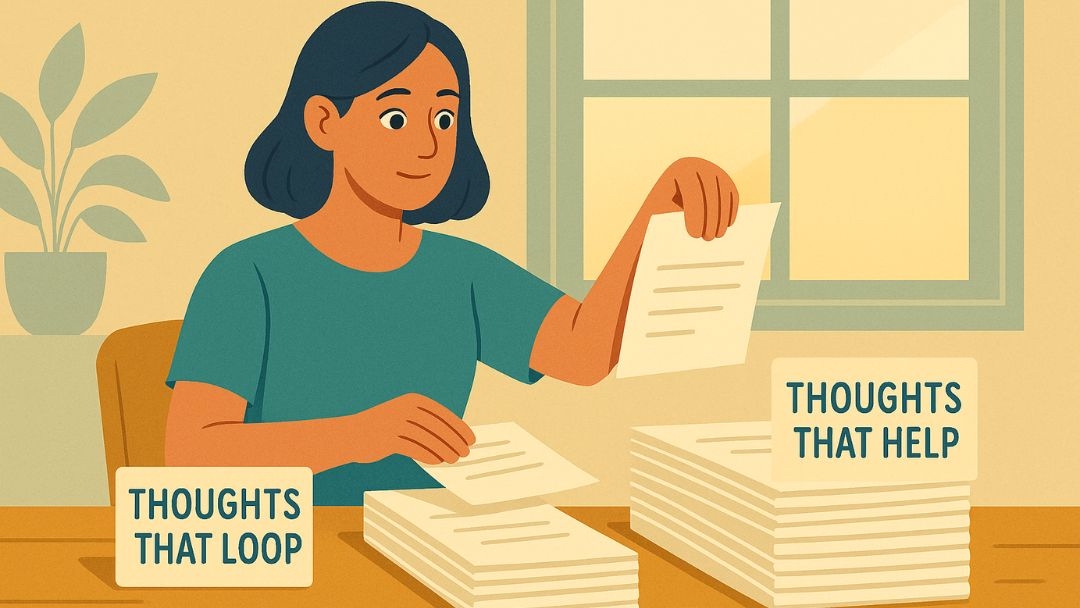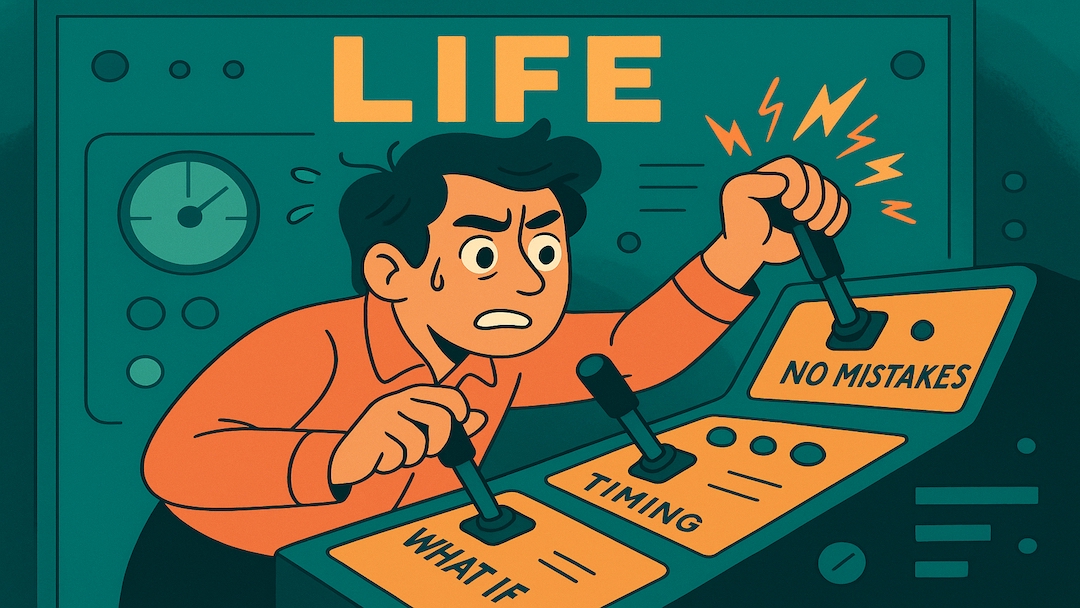How to Stop Overthinking (Without Shutting Down Your Mind): 10 Strategies That Work
If you’ve ever been told to “just stop overthinking,” you probably know how frustrating that sounds. It’s not a switch you can flip because those thoughts often feel automatic and out of your control. This piece unpacks why your mind tends to spiral and shares gentle, practical ways to find calm, one thought at a time.


Back
6 mins read
Did that cashier look at me funny? Was my coworker upset with me today? Do people even like me? I know that missing heart emoji in my partner’s text means trouble in paradise…
We’ve all had our overthinking moments. At least I know I have.
You know those 2 a.m. thoughts that keep you awake when your mind just won’t shut off? One moment you’re trying to sleep, and the next you’re replaying a conversation from last week or imagining everything that could possibly go wrong in tomorrow’s meeting.
Overthinking can quickly spiral into a pattern that keeps you stuck in your head and away from the present. You start to feel emotions from moments that haven’t even happened or preparing for problems that may never even come.
I’ve been there.
At first, it felt like a superpower. I thought I was being prepared, thoughtful, even emotionally aware. But over time, I realized nothing drained me more. What once felt like control was really emotional exhaustion and anxiety. I knew I had to stop obsessing.
While we cannot stop thinking altogether, I’ve found that we can learn to change how we respond to our thoughts. And that’s why I’m bringing you ten tips that continue to help me. I hope they help you, too. Or at least give you a place to start.
Let’s walk through them together.
What Overthinking Really Is (and What It’s Not)

Overthinking is the repetitive analysis of past situations or future possibilities without any productive outcome. It’s when reflection turns into rumination, but instead of finding clarity, you end up going in circles.
Overthinking often shows up in two main patterns: rumination and worry.
- Rumination focuses on the past; replaying mistakes, regrets, or “what could I have done differently” moments.
- Worry fixates on the future; predicting worst-case scenarios and asking endless “what if” questions.
But does every form of mental reflection count as overthinking? Not exactly. There’s a healthy kind of thinking through, the kind that helps you make better decisions, learn from experience, or plan intentionally.
Say you’re a business owner deciding whether to invest in a new tool. Healthy reflection might look like weighing the pros and cons, seeking advice, and setting a realistic budget.
Overthinking, on the other hand, sounds like this:
- You second-guess every choice, even after you’ve made it.
- You rewrite the same email five times before sending it.
- You replay conversations in your head, wondering how you sounded.
- You avoid taking action because you’re waiting to feel “100% sure.”
Recognizing when you’re overthinking is important. However, to truly break free from these thought patterns, it helps to understand why they happen in the first place and what’s really going on in your mind when your thoughts take over.
Common Reasons You Might Overthink

There’s no single cause for overthinking. It often develops from a mix of emotional, psychological, and environmental factors. Here are some of the most common ones:
1. Fear of Making Mistakes or Being Judged
When you have a strong fear of failure, it’s easy to overanalyze every decision. Maybe it’s because of a past experience that went wrong, pressure to meet expectations, or simply your own high standards. The mind goes into “analysis mode” to avoid mistakes, but ironically, that only increases stress.
2. A Need for Control or Certainty
We like to believe that if we think long enough, we’ll find the perfect solution or prevent bad outcomes. But since life is uncertain, this mental loop never ends. Overthinking becomes a way of trying to gain control over what can’t really be controlled. This can be common with perfectionists and Type A personalities, as well as people with certain attachment styles.
3. Unresolved Emotions
Sometimes, overthinking isn’t about the situation at hand but emotions we haven’t fully processed, like guilt, anger, anxiety, or emotional reasoning. The mind replays events because it’s trying to make sense of those lingering feelings.
4. Perfectionism and Self-criticism
If you hold yourself to impossibly high standards, your thoughts can become a nonstop performance review. Perfectionism often fuels rumination and worry, both of which reinforce overthinking patterns.
5. Underlying Mental Health Factors
Overthinking itself isn’t a mental illness, but it’s closely tied to certain conditions. For instance, people with Generalized Anxiety Disorder (GAD) often experience excessive, uncontrollable worry and tend to imagine worst-case scenarios, even for small issues.
6. The Brain’s Role in Overthinking
Overthinking is your brain’s way of trying to protect you. This often happens when the brain’s threat system is activated, so it starts analyzing, predicting, and rehearsing outcomes to avoid danger. It’s a form of self-protection that goes too far, keeping you stuck instead of safe.
How to Break the Cycle: 10 Practical Ways to Stop Overthinking

Once you understand what drives your overthinking, the next step is learning how to interrupt it. Here are simple, practical strategies to help you get out of your head:
1. Notice When You Are Overthinking and Name It
The first step to breaking the cycle is awareness. When you catch yourself slipping into what-ifs, pause and name it: “I’m overthinking right now.”
Labeling your thoughts helps you step back from them instead of being swept away.
You can also journal or record voice notes when your mind feels noisy. Seeing your thoughts outside of your head, on paper or in a recording, often reveals how repetitive they are, which makes them easier to manage.
2. Challenge Negative Thoughts
Not every thought you have is a fact. Sometimes, your brain tells stories based on fear rather than truth.
Try this three-step approach:
- Notice the thought: “I always say the wrong things. People must think I’m awkward.”
- Challenge it: “Is that true all the time? Has anyone actually told me that?”
- Reframe it: “Sometimes I stumble over my words, but that’s okay. I can work on expressing myself more clearly.”
This process teaches your brain to question distorted thinking patterns instead of accepting them as reality.
3. Get Out of Your Head and Into Your Body
When your thoughts start looping, grounding yourself in the present moment helps.
Try slow breathing, gentle stretches, or a short walk, anything that connects you to your senses.
You can also do a quick “five senses check-in”: name one thing you can see, touch, hear, smell, and taste.
Mindfulness-based practices can reduce rumination and improve emotional regulation by helping you step out of repetitive thought loops.
4. Set a “Worry Window”
Instead of fighting your thoughts all day, schedule them.
Give yourself 10–15 minutes at a fixed time each day to think through your worries intentionally. If anxious thoughts come up outside that time, remind yourself, “I’ll think about this later.”
This will especially help you if you often find yourself overthinking at night.
Writing your thoughts and revisiting them only during your worry window trains your brain to delay rumination, and often, you’ll find those thoughts won’t feel as urgent when you revisit them later.
5. Shift from “What If” to “What Is”
When you catch yourself spinning on “what if” scenarios, ground yourself in facts.
For example, instead of “What if they don’t like me?” say, “Here’s what I know right now: I showed up, I did my best, and that’s enough.”
Bringing your focus back to the present replaces imagined fears with reality-based calm.
6. Take Imperfect Action
The fear of making mistakes often shows up as overthinking. Yet, clarity doesn’t come from thinking loops, it comes from doing. Start with one small step, even if it feels uncertain. Each action teaches your brain that not knowing what comes next isn’t dangerous, it’s merely a part of how you learn and grow.
7. Let Go of the Need to Control Every Outcome
You can’t predict or manage every variable, and trying to do so only drains your energy. Trust that you can handle what comes, even if it’s not what you expected. Shift from “I can’t mess up” to “I can handle whatever happens.” Every experience, even the awkward or uncomfortable ones, builds emotional resilience.
8. Strengthen Your Emotional Intelligence
Overthinking often stems from emotions you don’t fully understand — worry, fear, guilt, or uncertainty. Strengthening your emotional intelligence helps you recognize what’s really going on beneath your thoughts. As I've mentioned. when you can identify and name what you’re feeling, it becomes easier to calm your mind, respond with balance, and let go of the mental spiral.
9. Practice Self-Compassion
Approach your thoughts with curiosity instead of criticism. Instead of judging yourself for overthinking, remind yourself that this is a habit, not a flaw. Each time you notice it and redirect gently, you’re already making progress.
10. Ask for Help When It Feels Heavy
You’re not meant to untangle every thought alone. Sometimes, the quickest way to quiet your mind is to let someone else in.
Reach out to a trusted friend, family member, or even a qualified therapist when your thoughts start to feel too heavy to handle on your own. Talking things out not only releases the pressure but also gives you perspective.
A professional can also help you build tools to manage racing thoughts and challenge the mental habits that keep you stuck.
Overthinking loses much of its power when it’s shared, named, and understood out loud.
Building a Calmer Mind, One Thought at a Time

Everyone overthinks sometimes. It’s a normal part of being human.
What matters is learning how to manage those thoughts when they start to feel overwhelming.
Start small:
- Journal every night to clear your head. Practice gratitude and journal again in the morning.
- Try one grounding exercise when anxiety builds.
- Ask yourself, “Is this helping me right now?” when you notice your mind racing.
- Use the powers of positive thinking and positive affirmations to steady yourself and transform your life.
- Take time to assess your emotional intelligence skills. Understanding how you process emotions can provide insight into what triggers overthinking and how to calm it faster.
You can’t control every thought, but you can learn to live peacefully with your mind.
And with practice, you’ll begin to notice more calm moments between thoughts. Over time, that calm grows into a steadier sense of peace that comes from giving your mind a chance to rest.


Return to Blog





